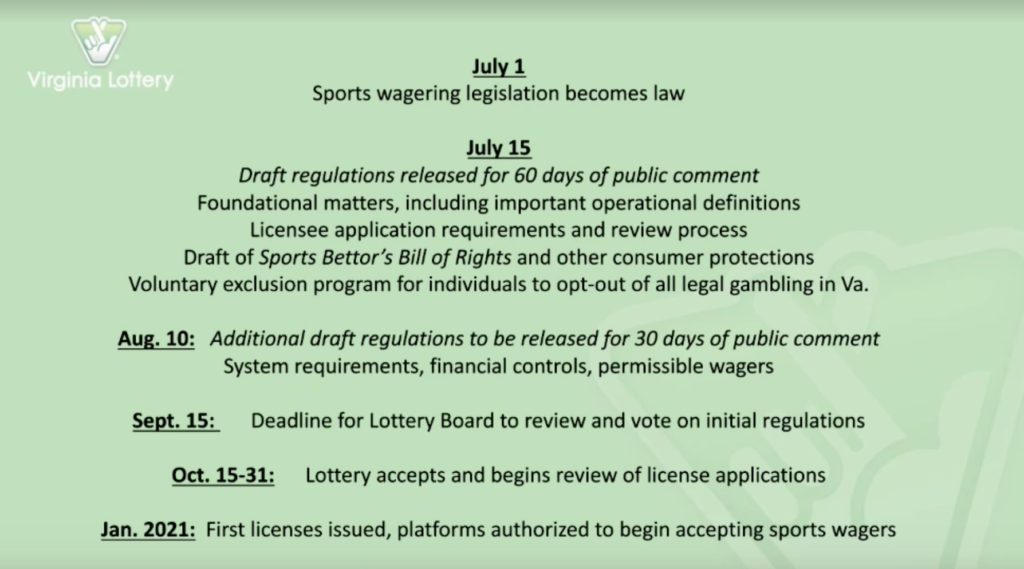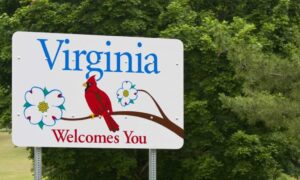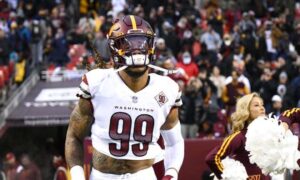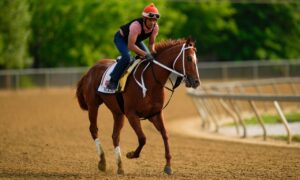
The rollout of legal VA sportsbooks took a significant and expected step forward on Wednesday morning with the Virginia Lottery board of directors.
Anyone in the state can now review and comment on the partially developed and initial sports betting regulations.
Moreover, the board shared a remarkable update on the recently concluded fiscal year. Furthermore, it highlighted the factors that make the current fiscal year potentially the most successful one for the VA Lottery.
Sports betting regulations and an updated timeline
Assuming the plan unfolds smoothly, operators in VA can anticipate receiving licenses to provide sports wagering at the start of the upcoming year.
Kevin Hall, the executive director of the lottery, delivered a presentation providing updates on the anticipated launch of VA sports betting.

According to Hall’s presentation, it was mandated by state law for the lottery to make draft regulations accessible to the public by Wednesday. In general, the lottery managed to meet this deadline.
Hall’s most noteworthy news was related to what the regulations would not include. Specifically, he announced that VA would not enforce a payout cap on operators, similar to the one implemented in Tennessee earlier this year.
The initial guidelines consist of measures to protect consumers, application forms for obtaining licenses, guidelines for a self-exclusion program, and a set of rights called the “Sports Bettor’s Bill of Rights.” While the latter offers a distinct perspective on consumer protection, the majority of the specifications align with industry standards.
An instance is when one of the provisions in the document places the responsibility of safeguarding the identifying information of bettors on upcoming operators.

This holds true for operators in the majority of states where wagering is legal. The way these rights are presented has the potential to instill trust in the regulatory system among residents of Virginia.
Although the majority of the proposed rules can be found on the lottery website, one essential component of the draft regulations is still absent.
Permissible events a big shoe yet to drop
One significant category that the law currently excludes pertains to in-state college sports teams. Virginians will need to exercise patience as they await responses to additional inquiries, which may take a few more weeks.
By August 10th, there should be an initial roster of events that are allowed for betting.
When the documents are released, some things to keep an eye on include:
- Is esports included on the list? If yes, are there any qualifications, such as requiring the majority of competitors to be at least 18 years old?
- Is Ukrainian table tennis going to be included in the list? This is a contentious matter due to allegations of match-fixing.
- What if we implement restrictions on proposition bets? For instance, should we allow Virginians to place bets on coin toss outcomes and Gatorade colors?
Until the board votes to approve these regulations, Virginians should be aware that they are still considered prohibitive. At present, the board’s primary focus is on collecting public feedback regarding the proposed regulations.
Until September 9, individuals residing in Virginia or anyone interested in joining the sports wagering industry can submit their comments online.
Not only was the release of these drafts good news, but the board also had other positive updates to share. In essence, the current state of the VA Lottery is extremely promising.
Commonwealth is sharing the wealth
Despite the challenges posed by the COVID-19 pandemic, the VA Lottery surpassed its goals as the fiscal year concluded on June 30th. The board provided an update on its financials during this period.
Between July 1, 2019, and June 30, 2020, the lottery generated sales exceeding $2.1 billion. It allocated over $587 million to public schools and managed to stay slightly below its administrative expenses target by 0.5%, settling at a mere 5.5% of revenue.
Due to the achievement, the lottery board has set even greater aspirations for the fiscal year 2020-21. Anticipating $2.4 billion in sales, the board aims to allocate $635 million to schools and decrease administrative expenses by 0.5%.
However, it is highly likely that the sales figure may be underestimated. The Virginia iLottery, which was introduced earlier this month, has proven to be extremely successful thus far.
The lottery’s online products have generated approximately $16 million in activity within the initial two weeks, with over 29,000 players participating. Nearly half of these players were newcomers to the lottery’s digital platforms.
The instant win tickets have proven to be incredibly popular, generating over $2 million in revenue and accounting for a whopping 94% of the overall traffic. Although there is a possibility that this initial success may not be sustained in the long run, it is safe to say that the lottery could not have hoped for a more impressive beginning.
If online sports betting starts off as successfully early next year, it will unquestionably be a year of breaking records for the lottery. Currently, everything appears to be proceeding as intended.







